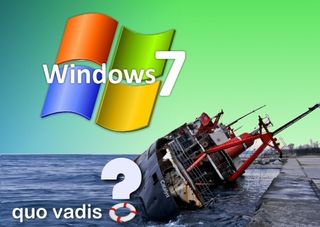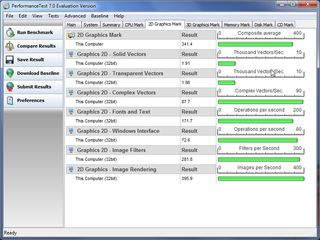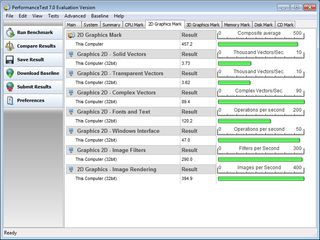2D, Acceleration, And Windows: Aren't All Graphics Cards Equal?
Windows 7: Radeon HD 5000-Series Cards Lack 2D Acceleration
ATI put a ton of effort into developing this latest generation of DirectX 11 hardware; it's only natural that it'd take some time for the software side to mature (and it's hardly a secret that subsequent driver releases improve performance and stability in a number of different ways). We can't exempt Nvidia from this observation either, since we also find a similar problem in its GeForce driver set when using 2D graphics on the company's mobile processors. For this article, we used the most current Catalyst version, 9.12.

Problem 1: ATIKMDAG Stopped Responding, Then Recovered
Anybody who’s experienced this error message probably encountered it after shifting back into 2D mode after exiting a 3D application. We have to believe this very likely results from some kind of driver error.
Let’s recall: without Aero turned on, the DWM is deactivated, so there’s also no more 2D acceleration, either (this applies equally to Windows 7 as it does to Vista). Because we ran into this error repeatedly on test systems with Radeon HD 5750s and Radeon HD 5870 installed (in two different test configurations), we forcibly deactivated Aero across the board. After this evasive maneuver, these errors no longer appeared. Interestingly, the exact same situation (and remedy) also presented itself to us on a notebook PC with GeForce graphics. Whether this is just a massive coincidence or an indication of a conflict among DWM, drivers, and 2D hardware graphics acceleration, only time will tell.
Our next prime suspects include the relatively low default clock speeds for ATI cards running in 2D mode, or perhaps some issue with an early graphics BIOS. Determining whether these two possible culprits are in cahoots or working independently is something we can establish only through long-term observation, or a definite change in behavior thanks to a new driver version.
Problem 2: ATI fails to deliver 2D Hardware Acceleration for GDI, either in whole or in part
We basically stumbled onto this problem due to our difficulties in getting the Radeon HD 5870 to handle 2D graphics. Many might infer from this experience that 3D cards are made for gaming, not for 2D applications. But anybody who’s read through the preceding sections of this article must admit that this has only really become a significant point with the release of Windows 7 (and not Windows Vista). To be more specific, most 3D cards will cut the 2D mustard reasonably well these days. But a direct comparison between the GeForce GTX 285's and Radeon HD 5870's 2D capabilities results in a besting of the ATI card. In fact, even compared to Nvidia's GeForce 7050 (nForce 610i) onboard graphics solution, without its own frame buffer, the newer Radeon places second-best.
Stay On the Cutting Edge: Get the Tom's Hardware Newsletter
Get Tom's Hardware's best news and in-depth reviews, straight to your inbox.
Things get even more interesting when the DWM is disabled. Even though no 2D acceleration is possible here, the ATI card jumps into the lead with regard to performance. Compared to Nvidia's GeForce board, running the ATI card with DWM disabled puts it well ahead. Even CorelDraw and AutoCAD run noticeably faster on the Radeon HD 5870 when DWM is turned off. This turns the tables on Nvidia, and contradicts our previous logic and experience benchmarking these GPUs.


For these reasons, we repeated our PassMark tests on these cards.


Unfortunately, none of these tests could pinpoint the issues we were seeing or shed any light on the nitty-gritty details behind the disparate performance numbers. That’s what led us to create our own benchmark, which helped us get closer to the root causes of the issues involved.
Current page: Windows 7: Radeon HD 5000-Series Cards Lack 2D Acceleration
Prev Page Windows 7: Return Of The Prodigal Son Next Page Tom2D Benchmark: Radeon HD 5870 Vs. GeForce GTX 285 In Windows 7-
pcxt21 Very nice work! Until that little update I was ready to put my old Matrox Millennium (1996/1997 I think) 2d accelerator back into my gaming rig...Reply -
For those who still remember Matrox...shouldn't that be included in the test as well? Ancient history shows that it was the best card to be paired with VooDoo when first released...:PReply
-
one-shot LOL. The clip of Steve Ballmer looks like an ad from the late Billy Mays. To think he's the CEO of Microsoft after watching that clip makes me laugh. I'm going to watch it again.Reply -
chookman I actually went to put a Professional Matrox card (G550 PCI-e) in my Windows 7 machinde for a few more displays... alas it seems most of the range doesnt have Windows 7 drivers yet :(Reply -
belardo The sad thing is, as shown was that Windows 1.0~3.0 were never an operating system, ever. 1.0~2.x we're never really used by anyone, yet Amigas and Macs had full GUI functionality since 85/84... Windows3 was at least usable, but still a single-tasking POS, and yet MS-DOS was able to dominate the computer industry... not because of talent, but because of luck, good moves by Gates & Ballmer and the stupidity of IBM. It kind of worked out anyway thou.Reply
Think about it, it wasn't until the tail-end of 1995, with the release of Windows95, did MS produce an actual GUI OS for the general public, 10 whole years after Apple's Mac and the Amiga by chicken lips. Atari only copied much of the hardware abilities of Amiga with a variant of a MS-DOS clone.
Only business bought PC-Clones in the 80s~90s, paying around $1500~4000 per desktop. Since IBM didn't make the OS and the hardware was generic, it was super easy for clones to exists. Home users bought Amigas and Macs and laughed as DOS users... but in the end, they lost to the clones.
At one time in 1990, the Computer Shopper Mag was about 500 pages (phone book) with at least 500 Clone companies advertising.
Windows is still the Copy-Cat OS. Its still an ugly beast under the hood. At least Windows7 runs good and looks nice.
-
Raid3r Indeed, way to take one for the team..I am one of those 2d workers and greatly appreciate the foot that was used to affirm the position of 2d recognition on these "new" cards. I can't say it enough.Reply -
micky_lund woot for toms...Reply
catch some more massive companies out, and make them fix up their drivers -
belardo I just finished reading this entire article. A good one too guys.Reply
While I had my rant about old MS days, I did work in the PC field starting with 3.1. We'd benchmark various video cards with programs that would test lines, boxes, etc. This WAS important for some games like DOOM and Quake which were not "true" 3D cards we have today.
For every new type of PC build or a clients computer, I would save these generic overall system benchmarks. And I *have* notice different 2D performance abilities of computers and the various cards. All super fast compared to the 90s, but I've seen a GF card perform worse than an older ATI, but also an older ATI work a bit better than a newer one. These are all WinXP and don't have anything to do with the problems of Win7 and/or DX11... Part2 isn't out yet... but I would be curious to see if the problems in Win7 happens in Vista with DX11 installed hmmm.
ATI has been putting all their work into 3D gaming performance, its good to see that they have put a team to fix their 2D issues. There is a good chance that this is a DX11 issue they were not aware of. Since Nvidia doesn't have any DX11 parts (but a DX10.5) - this "bug" doesn't yet show... but I'm speculating of course. :)
With the eye-candy of Win7, the 2D performance *IS* important for those doing work, watching videos, etc. No good excuse to miss this, and hopefully ATI will have it resolved in 1-2 months.
PS: Your memory usage chart of vista vs Win7 shows exactly WHY Vist . That is why Windows7 runs pretty good on a 1GB computer, but Vista still needs at least 3GB for a bottom-end PC. My notebook has Win7rc with 1GB, runs fine.
Hey, will your results sometime include intel graphics? After this bug-issue is resolves, include overall-2D scores with your graphics Charts. :)